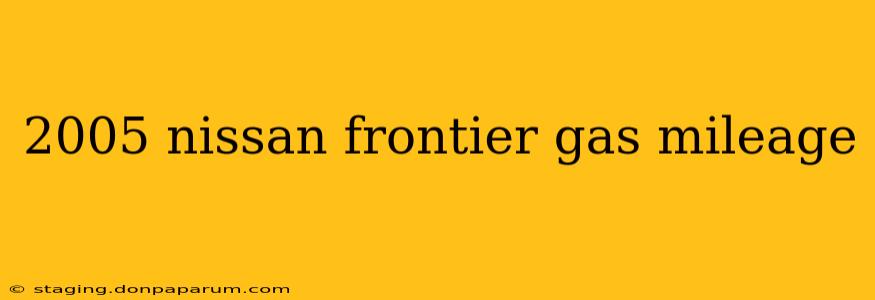The 2005 Nissan Frontier is a popular choice for those seeking a reliable and capable mid-size pickup truck. However, fuel efficiency is a key concern for many buyers. This guide will delve into the gas mileage you can expect from a 2005 Nissan Frontier, exploring factors that influence fuel economy and offering tips for maximizing your MPG.
2005 Nissan Frontier MPG: What to Expect
The gas mileage of a 2005 Nissan Frontier varies significantly depending on several factors, including the engine type, drivetrain, and driving habits. The 2005 model year offered two main engine options:
-
2.4L 4-cylinder: This engine generally offered better fuel economy than its V6 counterpart. Expect to see city MPG in the low 18s and highway MPG in the mid-20s, though actual results will vary.
-
3.3L V6: This more powerful engine sacrifices fuel efficiency for increased performance. City MPG will likely fall in the low 16s, while highway MPG might reach the low 20s. This is significantly lower than the 4-cylinder option.
Important Considerations: These figures represent EPA estimates. Your actual gas mileage will depend on several variables, including:
- Driving Style: Aggressive acceleration and braking significantly reduce fuel efficiency. Smooth, consistent driving is key to maximizing MPG.
- Terrain: Driving in hilly or mountainous areas will reduce fuel economy compared to driving on flat terrain.
- Vehicle Load: Hauling heavy cargo or towing a trailer will drastically decrease your gas mileage.
- Vehicle Condition: Proper tire inflation, regular maintenance (including timely oil changes and air filter replacements), and a well-tuned engine are crucial for optimal fuel efficiency.
- Climate Conditions: Extreme temperatures (both hot and cold) can impact fuel economy.
Factors Affecting 2005 Nissan Frontier Gas Mileage
Beyond the engine choice, several factors can influence your 2005 Nissan Frontier's fuel consumption. Understanding these elements can help you improve your MPG.
Driving Habits:
- Speed: Maintaining a steady speed, especially on the highway, is crucial for maximizing fuel efficiency. Avoid excessive acceleration and sudden braking.
- Idling: Minimize idling time. Turn off your engine if you'll be stopped for more than a minute.
- Air Conditioning: Using the air conditioner consumes extra fuel. Consider using it sparingly, especially in moderate temperatures.
Vehicle Maintenance:
Regular maintenance is paramount for optimal fuel efficiency. This includes:
- Regular Oil Changes: Using the correct weight oil and changing it at the recommended intervals is crucial for engine health and fuel economy.
- Tire Inflation: Properly inflated tires improve fuel efficiency and handling. Check your tire pressure regularly.
- Air Filter Replacement: A clogged air filter restricts airflow to the engine, reducing performance and fuel efficiency. Replace it as recommended.
- Tune-Ups: Regular tune-ups ensure your engine runs optimally, maximizing fuel economy.
Tips for Improving Your 2005 Nissan Frontier Gas Mileage
By understanding the factors that affect fuel efficiency and adopting some simple driving habits and maintenance practices, you can significantly improve your 2005 Nissan Frontier's gas mileage:
- Drive Smoothly: Avoid rapid acceleration and hard braking.
- Maintain Proper Tire Pressure: Under-inflated tires significantly reduce gas mileage.
- Keep Your Engine Tuned: Regular tune-ups will help your engine run efficiently.
- Use Cruise Control: On the highway, cruise control helps maintain a consistent speed and saves fuel.
- Lighten Your Load: Avoid carrying unnecessary weight in your truck bed.
By following these tips and understanding the factors affecting gas mileage, you can significantly improve fuel efficiency for your 2005 Nissan Frontier and save money at the pump. Remember, the EPA estimates provide a baseline; your actual mileage will vary depending on your driving habits and vehicle maintenance.

